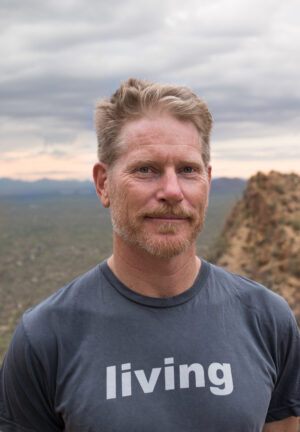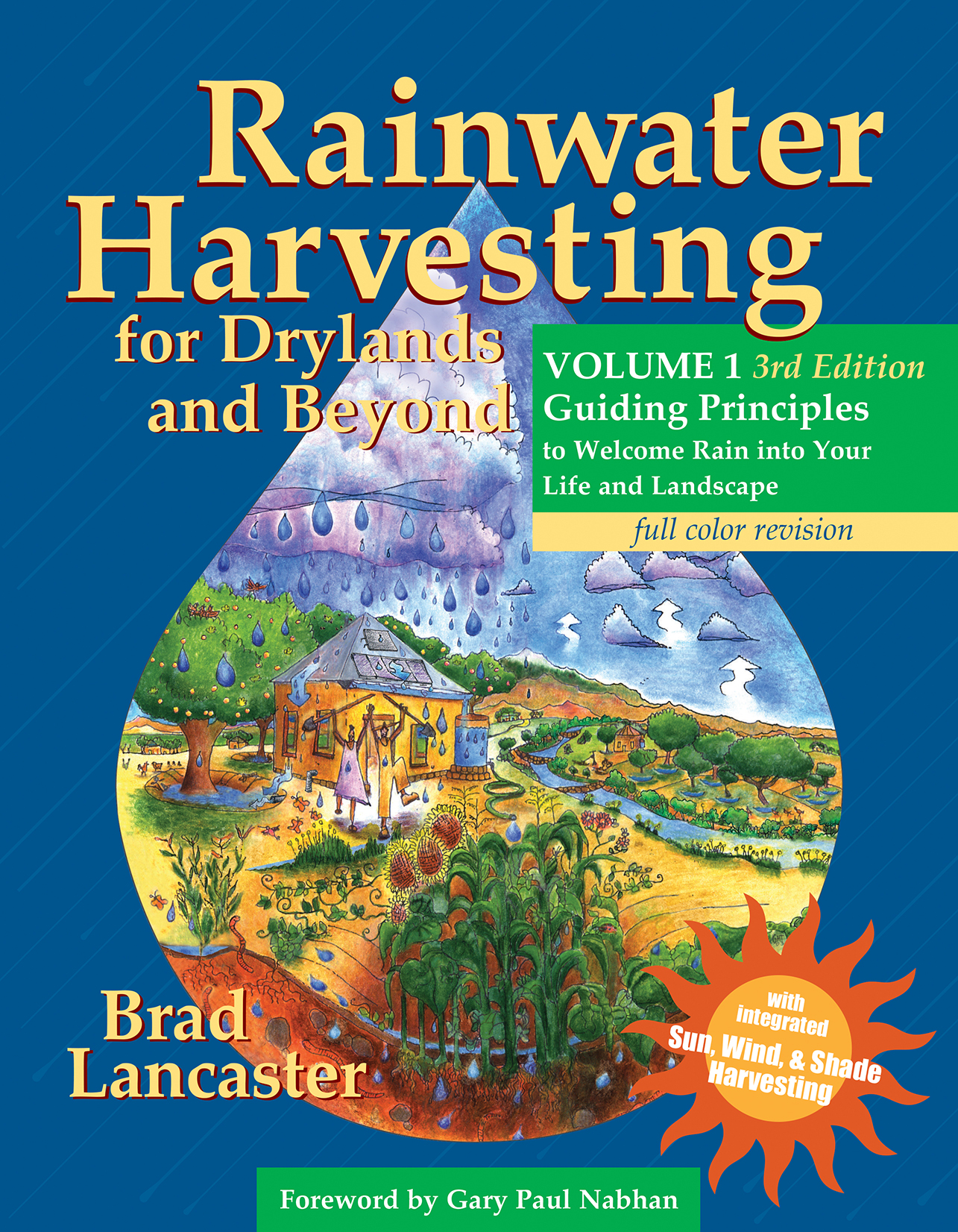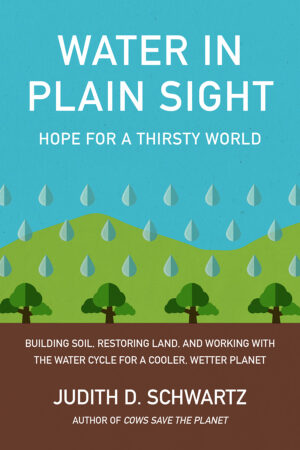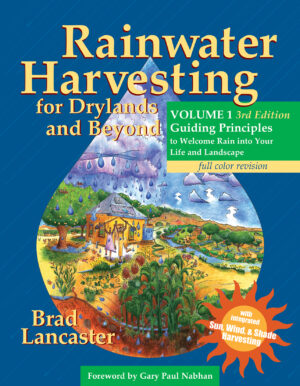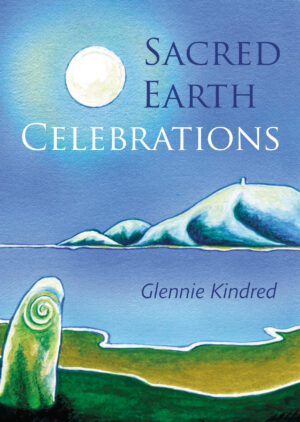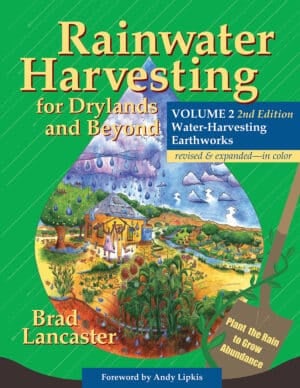Rainwater Harvesting for Drylands and Beyond, Volume 2, 2nd Edition
Water-Harvesting Earthworks
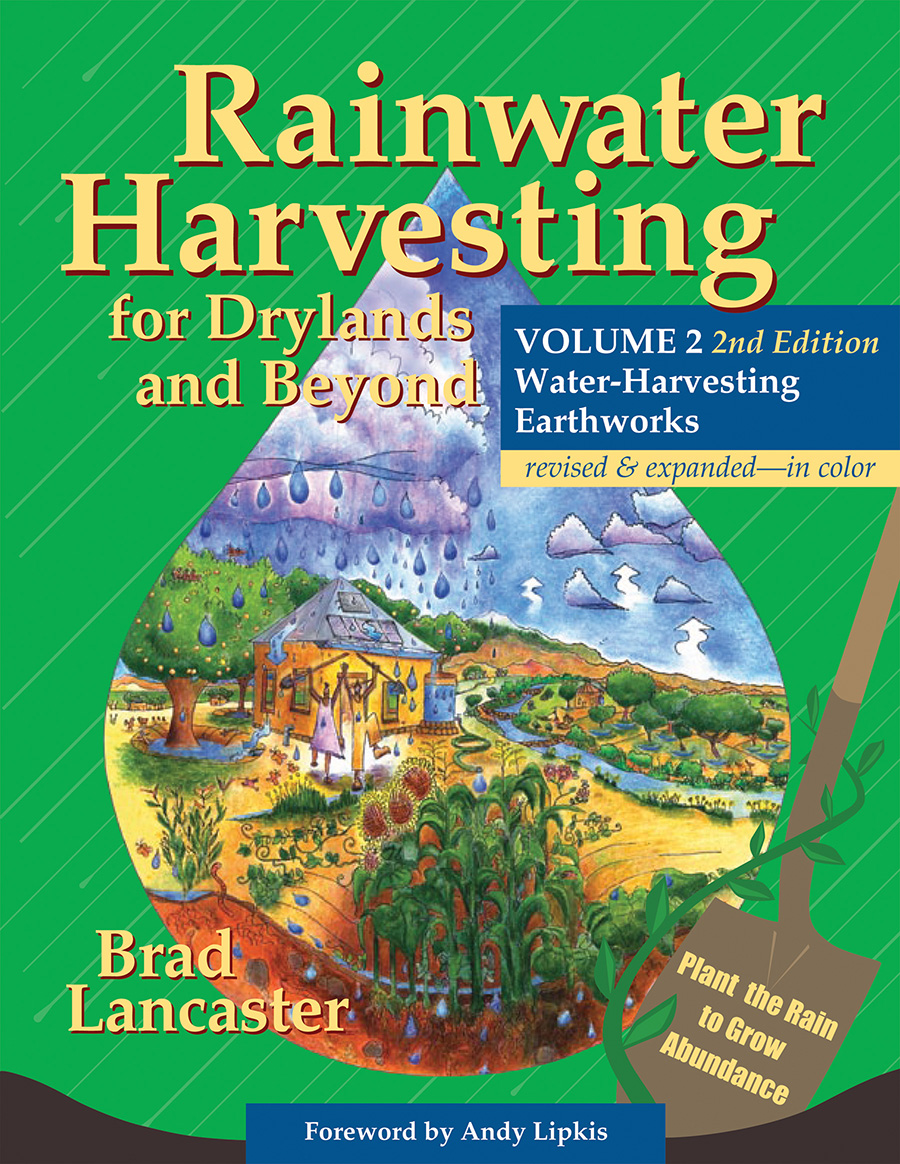
Rainwater Harvesting for Drylands and Beyond, Volume 2, 2nd Edition
Water-Harvesting Earthworks
2020 independent Press Award Winner–Green Book Category
Rainwater Harvesting for Drylands and Beyond, Volume 2 is a how-to guide enabling you to “plant the rain” by creating water-harvesting “earthworks” or “rain gardens.” Earthworks are simple, inexpensive strategies and landforms that passively harvest multiple sources of free on-site water including rainfall, stormwater runoff, air conditioning condensate, and greywater within “living tanks” of soil and vegetation. The plants then pump the water back out in the form of beauty, food, shelter, wildlife habitat, timber and forage, while controlling erosion, reducing down-stream flooding, dropping utility costs, increasing soil fertility, and improving water and air quality.
This revised and expanded full-color second edition builds on the information in Volume 1 by showing you how to turn your yard, school, business, park, and neighborhood into lively, regenerative producers of resources. Conditions at home will improve as you simultaneously enrich the ecosystem and inspire the surrounding community.
Learn to select, place, size, construct, and plant your chosen earthworks. All is made easier and more effective by the illustrations of natural patterns of water and sediment flow with which you can collaborate or mimic. Detailed step-by-step instructions with over 550 images show you how to do it, and plentiful stories of success motivate you so you will do it!
Reviews and Praise
“Harvesting rainwater was once a worldwide technology, but was replaced by pipes, canals, and sprinklers: an inefficient and wasteful strategy that results in running dry. In Rainwater Harvesting for Drylands and Beyond, Volume 2 Brad uses the concept of ‘planting water’ as a guiding principle in designing landscapes that passively harvest resources to grow more resources. Such brilliant, low-tech, regenerative systems are vital to hydrating the land and maximizing the benefit that water brings to plants, animals and people. Thus, this book is an excellent and comprehensive tool for all bucket and shovel ‘engineers’ to maximize the hydrological resource, reduce energy use and transform their once erosive landscapes into ones of stability, botanical diversity, and abundance.”—Arty Mangan, Bioneers Food and Farming Program Director
More Reviews and Praise
“The original edition was a great book, and this edition is even better! The clear prose and illustrations, the consistently well-organized chapters, the themes and variations, the case studies, the practical design and construction information, the fun can-do attitude—these combine into a manual that is greater than the sum of its parts. Like my copy, you’ll have yours dog-eared with successful use!”—Dave Jacke, ecological designer, educator, and co-author of Edible Forest Gardens
“The cheapest and sanest way to meet our growing need for water is to squeeze (or cycle) more out of the water we already have, especially rainwater and used household water. Lancaster approaches these unsung streams as a farmer might, cultivating them in order to nourish dry landscapes. He has produced a water-farming guide that will inspire both the casual gardener and the card-carrying permaculturalist. With step-by-step instructions and clear illustrations, he guides the reader through simple techniques -berms, curbcuts, greywater plumbing – which in turn guide water into your soil and landscape. Lancaster is clearly determined to save the world. And he’s determined to make it easy for the rest of us to help.”—Hannah Holmes author of Suburban Safari: A Year on the Lawn
“As mayor of a city in the desert southwest, this book is a critical resource to me for implementing strategies that support ecological restoration and community resiliency.”—Emily S. Niehaus, founder of Community Rebuilds and Mayor of Moab City, Utah
“Brad’s work is a labor of love for water and life. The breadth, depth, and clarity of this book goes far beyond the usual technical manual. Its deep heart allows these ideas to stick and makes this book a compelling invitation to actively participate. This is a philosophy of life, an offering, made practical in a way that renews life and expands our co-evolutionary engagement.”—Bill Reed, AIA, principal in Regenesis. A founding Board of Director of the US Green Building Council, co-founder of LEED Green Building Rating System, and leader in Integrative Systems Design
“I highly recommend this book to those working hard to be good living ancestors and to those who truly care about the next generations.”—Lilian Hill, Executive Director, Hopi Tutskwa Permaculture
“This is the right book at the right time for a world where water security is one of the most important socio-ecosystemic challenges humanity faces.”—Delfín Montañana, Urban Biologist, Bio·Logica·Urbana consultancy; Director, Socioecological Education, Isla Urbana
“There is nothing like this comprehensive and well-illustrated book about capturing and repurposing rain and other free on-site waters. It’s a must-have for every household, policy maker, and professional interested in making their homes, communities, and world more sustainable, self-sufficient, and vibrant.”—Betsy Damon, Founder of Keepers of the Waters
“From Rajasthan to Arizona, Brad learns and teaches, showing how it can be done and why it should be done. Hugely practical and genuinely inspirational.”—Fred Pearce, journalist and author of When the Rivers Run Dry
“This very informative book, based on real-life successes, has a very wide application even across the seas. What touches us most are Brad’s friendly narration and the ‘tell-tale’ illustrations that have an eye for detail.”—Shree Padre, Messenger of Rainwater Harvesting, India
“With this book anyone, at any scale of project, can harvest the rain.”—Judy Mielke, landscape architect and author of Native Plants for Southwestern Landscapes
“As someone working along with others to directly help refugees and other displaced populations grow more of their own food—often in dryland situations—this book gives us the tools to create lasting change. I carry it in my travel bag wherever I go.”—Thomas Cole, Resilience Design and Agroecology Consultant
“Bridging the gap between DIY and savvy professional work, this is the book everyone should own if they get rainfall in their climate….that means YOU!”—Matt Powers, educator and author of The Permaculture Student 2
“Brad Lancaster has written the definitive how-to guide for harvesting rainwater. Much of this information has been near impossible to find, and we owe Brad a huge debt for assembling it so lucidly. These universal principles work not just in drylands, but in wetter climates too. This is by far the best resource for designing and building Earth-friendly, low-cost solutions to help us save our most precious resource: water.”–Toby Hemenway, author of Gaia’s Garden: A Guide to Home-Scale Permaculture
“Everyone wants to ‘go green’ lately and, usually, the expression is followed by a plug for a new product. Brad offers a shovel instead, and directs you, literally, not figuratively, to your own back yard. We’ve tried some of the methods explained in this book, and they work. Even if you’re a lazy, mediocre, vagabond gardener, like we are, they still work. And if you don’t take the time to understand every technical detail so thoroughly outlined in this bible of rainwater– these methods still will work.”–Shay Salomon and Nigel Valdez, author and photographer, Little House on a Small Planet
“Get out your shovels and dance in the rain! That is what Brad Lancaster’s second volume in his trilogy on rainwater harvesting, will make you want to do. This outstanding book provides an abundance of well-documented ideas and tools for sustainable living in your watershed. You don’t have to let wasteful, polluting large-scale water systems get you down! Get out, get wet, and become a positive part of the hydrological cycle!”–David A. Cleveland, U of California, Santa Barbara (www.es.ucsb.edu/faculty/cleveland) and Center for People, Food and Environment; co-author of Food from Dryland Gardens
“Many approach water as a problem: there’s too much, too little, or it’s in the wrong place. Brad Lancaster’s indispensable book demonstrates the myriad ways that no matter where you live, water is an opportunity to create more beauty in our cities and landscapes, to grow more food, to build community resilience and reduce infrastructure costs, and to mitigate climate change—since climate is largely driven by hydrology. Brad’s book is filled with essential information ranging from general insights on how water moves to detailed instructions for professionals and homeowners on how to implement water harvesting.”—Judith D. Schwartz, author of Water In Plain Sight: Hope for a Thirsty World
Kirkus Reviews–
"This comprehensive second edition includes Lancaster’s revised tactics for rainwater harvesting, new anecdotes, a host of visually pleasing images by debut illustrator Marshall, and many colorful photographs by the author and others. Much of the book extols the virtues of various earthworks—like berms that capture runoff and spread water over a broad area. Using earthworks can also flush out bad salts from the soil over time, reducing the loss of precious farmland. Lancaster’s smooth prose is easy to read, and it’s not necessary to have a scientific mind in order to understand his eight common-sense principles for rainwater harvesting. For example, he suggests that potential water farmers begin by studying the land to learn its patterns of rain and sediment flow and determine the best type of earthworks needed. Practical tools are included, such as illustrated, boxed instructions for measuring the slope of the land. Presenting many choices of earthworks—such as mulching, digging basins and trenches, planting vegetation, and building terraces—this expansive volume provides inspiration for harvesting rain and runoff in many types of yards and farmland. The author also delivers inspiration and advice for ways to harvest and reuse wastewater from appliances like washing machines. Readers who enjoy real-life success stories will find plenty of memorable ones here. For example, Chris Meuli of Albuquerque, New Mexico, fills trenches with junk mail, creating a “sponge” for watering trees.
A valuable wellspring of hands-on advice for effective watershed stewardship."
Reviews and Praise
“Harvesting rainwater was once a worldwide technology, but was replaced by pipes, canals, and sprinklers: an inefficient and wasteful strategy that results in running dry. In Rainwater Harvesting for Drylands and Beyond, Volume 2 Brad uses the concept of ‘planting water’ as a guiding principle in designing landscapes that passively harvest resources to grow more resources. Such brilliant, low-tech, regenerative systems are vital to hydrating the land and maximizing the benefit that water brings to plants, animals and people. Thus, this book is an excellent and comprehensive tool for all bucket and shovel ‘engineers’ to maximize the hydrological resource, reduce energy use and transform their once erosive landscapes into ones of stability, botanical diversity, and abundance.”—Arty Mangan, Bioneers Food and Farming Program Director
“The original edition was a great book, and this edition is even better! The clear prose and illustrations, the consistently well-organized chapters, the themes and variations, the case studies, the practical design and construction information, the fun can-do attitude—these combine into a manual that is greater than the sum of its parts. Like my copy, you’ll have yours dog-eared with successful use!”—Dave Jacke, ecological designer, educator, and co-author of Edible Forest Gardens
“The cheapest and sanest way to meet our growing need for water is to squeeze (or cycle) more out of the water we already have, especially rainwater and used household water. Lancaster approaches these unsung streams as a farmer might, cultivating them in order to nourish dry landscapes. He has produced a water-farming guide that will inspire both the casual gardener and the card-carrying permaculturalist. With step-by-step instructions and clear illustrations, he guides the reader through simple techniques -berms, curbcuts, greywater plumbing – which in turn guide water into your soil and landscape. Lancaster is clearly determined to save the world. And he’s determined to make it easy for the rest of us to help.”—Hannah Holmes author of Suburban Safari: A Year on the Lawn
“As mayor of a city in the desert southwest, this book is a critical resource to me for implementing strategies that support ecological restoration and community resiliency.”—Emily S. Niehaus, founder of Community Rebuilds and Mayor of Moab City, Utah
“Brad’s work is a labor of love for water and life. The breadth, depth, and clarity of this book goes far beyond the usual technical manual. Its deep heart allows these ideas to stick and makes this book a compelling invitation to actively participate. This is a philosophy of life, an offering, made practical in a way that renews life and expands our co-evolutionary engagement.”—Bill Reed, AIA, principal in Regenesis. A founding Board of Director of the US Green Building Council, co-founder of LEED Green Building Rating System, and leader in Integrative Systems Design
“I highly recommend this book to those working hard to be good living ancestors and to those who truly care about the next generations.”—Lilian Hill, Executive Director, Hopi Tutskwa Permaculture
“This is the right book at the right time for a world where water security is one of the most important socio-ecosystemic challenges humanity faces.”—Delfín Montañana, Urban Biologist, Bio·Logica·Urbana consultancy; Director, Socioecological Education, Isla Urbana
“There is nothing like this comprehensive and well-illustrated book about capturing and repurposing rain and other free on-site waters. It’s a must-have for every household, policy maker, and professional interested in making their homes, communities, and world more sustainable, self-sufficient, and vibrant.”—Betsy Damon, Founder of Keepers of the Waters
“From Rajasthan to Arizona, Brad learns and teaches, showing how it can be done and why it should be done. Hugely practical and genuinely inspirational.”—Fred Pearce, journalist and author of When the Rivers Run Dry
“This very informative book, based on real-life successes, has a very wide application even across the seas. What touches us most are Brad’s friendly narration and the ‘tell-tale’ illustrations that have an eye for detail.”—Shree Padre, Messenger of Rainwater Harvesting, India
“With this book anyone, at any scale of project, can harvest the rain.”—Judy Mielke, landscape architect and author of Native Plants for Southwestern Landscapes
“As someone working along with others to directly help refugees and other displaced populations grow more of their own food—often in dryland situations—this book gives us the tools to create lasting change. I carry it in my travel bag wherever I go.”—Thomas Cole, Resilience Design and Agroecology Consultant
“Bridging the gap between DIY and savvy professional work, this is the book everyone should own if they get rainfall in their climate….that means YOU!”—Matt Powers, educator and author of The Permaculture Student 2
“Brad Lancaster has written the definitive how-to guide for harvesting rainwater. Much of this information has been near impossible to find, and we owe Brad a huge debt for assembling it so lucidly. These universal principles work not just in drylands, but in wetter climates too. This is by far the best resource for designing and building Earth-friendly, low-cost solutions to help us save our most precious resource: water.”–Toby Hemenway, author of Gaia’s Garden: A Guide to Home-Scale Permaculture
“Everyone wants to ‘go green’ lately and, usually, the expression is followed by a plug for a new product. Brad offers a shovel instead, and directs you, literally, not figuratively, to your own back yard. We’ve tried some of the methods explained in this book, and they work. Even if you’re a lazy, mediocre, vagabond gardener, like we are, they still work. And if you don’t take the time to understand every technical detail so thoroughly outlined in this bible of rainwater– these methods still will work.”–Shay Salomon and Nigel Valdez, author and photographer, Little House on a Small Planet
“Get out your shovels and dance in the rain! That is what Brad Lancaster’s second volume in his trilogy on rainwater harvesting, will make you want to do. This outstanding book provides an abundance of well-documented ideas and tools for sustainable living in your watershed. You don’t have to let wasteful, polluting large-scale water systems get you down! Get out, get wet, and become a positive part of the hydrological cycle!”–David A. Cleveland, U of California, Santa Barbara (www.es.ucsb.edu/faculty/cleveland) and Center for People, Food and Environment; co-author of Food from Dryland Gardens
“Many approach water as a problem: there’s too much, too little, or it’s in the wrong place. Brad Lancaster’s indispensable book demonstrates the myriad ways that no matter where you live, water is an opportunity to create more beauty in our cities and landscapes, to grow more food, to build community resilience and reduce infrastructure costs, and to mitigate climate change—since climate is largely driven by hydrology. Brad’s book is filled with essential information ranging from general insights on how water moves to detailed instructions for professionals and homeowners on how to implement water harvesting.”—Judith D. Schwartz, author of Water In Plain Sight: Hope for a Thirsty World
Kirkus Reviews–
"This comprehensive second edition includes Lancaster’s revised tactics for rainwater harvesting, new anecdotes, a host of visually pleasing images by debut illustrator Marshall, and many colorful photographs by the author and others. Much of the book extols the virtues of various earthworks—like berms that capture runoff and spread water over a broad area. Using earthworks can also flush out bad salts from the soil over time, reducing the loss of precious farmland. Lancaster’s smooth prose is easy to read, and it’s not necessary to have a scientific mind in order to understand his eight common-sense principles for rainwater harvesting. For example, he suggests that potential water farmers begin by studying the land to learn its patterns of rain and sediment flow and determine the best type of earthworks needed. Practical tools are included, such as illustrated, boxed instructions for measuring the slope of the land. Presenting many choices of earthworks—such as mulching, digging basins and trenches, planting vegetation, and building terraces—this expansive volume provides inspiration for harvesting rain and runoff in many types of yards and farmland. The author also delivers inspiration and advice for ways to harvest and reuse wastewater from appliances like washing machines. Readers who enjoy real-life success stories will find plenty of memorable ones here. For example, Chris Meuli of Albuquerque, New Mexico, fills trenches with junk mail, creating a “sponge” for watering trees.
A valuable wellspring of hands-on advice for effective watershed stewardship."


